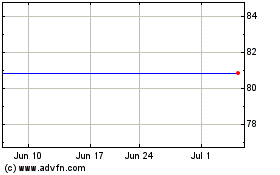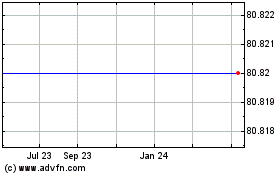Boston Scientific Disciplines Some Heart-Rhythm Staffers
February 11 2010 - 12:38PM
Dow Jones News
Boston Scientific (BSX) said Thursday that it cut some sales
staff and managers from its heart-rhythm device business for
disciplinary reasons, and that revenue could suffer this year as a
result.
Company executives declined to disclose the number of staffers
let go or the precise reasons why, although Chief Executive Ray
Elliott said there had been repeated breaches of the company's
health-care professional code of conduct. He discussed the matter
on Boston Scientific's fourth-quarter call.
Sales representatives in the competitive $11 billion
heart-rhythm market can take business with them to rivals, and
indeed, Elliott said St. Jude Medical Inc. (STJ) "has chosen to
quickly hire many of our departed staff."
St. Jude refuted that characterization. Angela Craig, vice
president of corporate relations, said the company in recent months
hired workers let go by Boston Scientific, only two of whom were
heart-rhythm sales representatives.
Boston Scientific estimated this issue, plus an advisory related
to a small number of defibrillator issues that sparked product
changes, could hurt this year's heart-rhythm business sales by up
to $100 million. The whole business, which includes pacemakers and
defibrillators, posted 2009 sales of $2.56 billion.
Shares of Boston Scientific dropped Thursday and were recently
down 9.7% to $7.49, pressured by what analysts said was weak
guidance for 2010.
Elliott defended Boston Scientific's disciplinary moves even if
sales are hurt. "We are going to run the company properly, and if
we're a somewhat smaller company short term or long term, so be
it," he said.
He also took offense to the rival company's actions. "We didn't
like the response of St. Jude medical to the disciplinary actions
we took during December," Elliott said during the call.
"So-called greener pastures may allow for a more relaxed
viewpoint" on relationships with health-care professionals, Elliott
added, yet "the problem with pastures are you have to be careful
where you step."
Craig said St. Jude expects all its employees to comply with
rigorous standards related to interactions with health-care
professionals. "The remarks from this morning strike us a little
bit like a bitter spouse after a bad divorce," she said.
The disciplinary moves drew a lot of analyst attention on Boston
Scientific's call. The medical-devices industry has been ramping up
disclosures regarding relationships with surgeons amid government
investigations into the matter in recent years.
The orthopedics sector--including Zimmer Holdings Inc. (ZMH),
which Elliott led for a decade--reached a deal with the Department
of Justice in 2007 to resolve an investigation into whether
companies were using surgeon payments to curry favor.
Elliott said Boston Scientific could lose more sales staffer in
the heart-rhythm business this year, but not because of ongoing
disciplinary issues. Instead, some employees may choose to join
friends at other companies, he said.
He said these moves were done under the company's own power and
not because of any outside pressure. "There's a line in the sand
and it's binary," Elliott said, regarding conduct requirements for
workers.
Regarding the risk of Boston Scientific luring some government
disciplinary actions, Elliott said he's more interested in whether
workers are behaving properly.
On the device issue, Boston Scientific is working to strengthen
the bond between the plastic cap and metal case on its popular
"Cognis" and "Teligen" defibrillators after finding isolated
evidence of weakened bonds on devices implanted under chest
muscles.
The vast majority are placed just under the skin, and while an
article in the medical journal HeartRhythm cited a problem with one
such implant, Boston Scientific blasted back in a release Wednesday
and again on Thursday's call.
The journal "was completely out of line to publish this article
prematurely," and without Boston Scientific's analysis, Elliott
said. The company said a weakened header bond was not related to
abnormal device actions in this case. Instead, wires to the heart
made by another company may be at issue, the company indicated.
-By Jon Kamp, Dow Jones Newswires; 617-654-6728;
jon.kamp@dowjones.com
SJM (NYSE:STJ)
Historical Stock Chart
From Sep 2024 to Oct 2024

SJM (NYSE:STJ)
Historical Stock Chart
From Oct 2023 to Oct 2024
